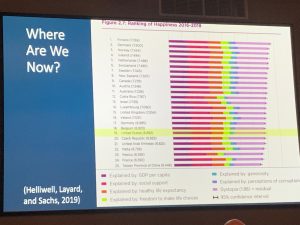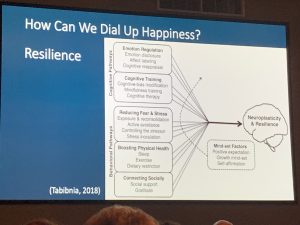10 things I Learned at the Science of Happiness Retreat


Going forward, I’ll be writing more about Well-Being and the intersection of well-being and travel.
At the start of May, I spent a long weekend at Multiversity 1440 the Science of Happiness gathering, which was being held in partnership with 1440 Multiversity at UC Berkeley Greater Good Science Center. They have a beautiful college campus nestled in the forest of Northern California near Santa Cruz where more than 300 people gathered to listen to preeminent authors and researchers of happiness.
It all began on Thursday evening with a confronting slide – the United States has the number 1 GDP in the world but is the 19th happiest country. So obviously there is no correlation between economic growth and happiness.
Over the course of the next few days, I attended a whole range of seminars, meditation sessions and workshops exploring the science of happiness and thought I’d share some of the most important things I learned.
- Happiness and wellbeing are skills that are developed over time. By practicing fundamental virtues, we can enhance our ability to be happier. The four keys to an open mind are joy, peace, love and compassion while inequality is the biggest issue impacting happiness in the world today.
- Compassion is a fundamental human trait that has evolved over time (this has been scientifically proven) and we can turn empathy into compassion. We need to understand one another’s cultures, listen attentively and be with people in their worst times.
- Kindness and altruism are intertwined – doing good is an essential ingredient to being happy and happiness helps spur kindness and generosity. It’s an investment in the wellbeing of the other for his or her own sake, not your own. That is what we need others to understand. We each have a responsibility in our own community.
- Community is lacking in society due to independence and racism. As a society, we fail to provide support groups and help for one another. We are responsible for others in the community and must take steps to help each other.
- Racism is killing our communities because we don’t build the right bridges. We need to build bridges in our community through empathetic listening and understanding. Micro-moments of connection, such as smiling at strangers, are really vital ingredients for our survival and a better society.
- We can retrain our brains! There are ways we can be mindful by understanding what triggers our emotions through emotion mapping. Emotions occur around 30-90 seconds after a trigger and if you can counter these, then you can stop your reaction and the subsequent shame/blame cycle. Emotions actually occur before reaction so if you can detect your emotional response, then you can contain your reaction. Our brains are wired with an implicit bias about what is good and what is bad that happens in milliseconds but we can retrain them to do otherwise.
- Try other forms of meditation. There are various new forms of mediation that can be used to create a peaceful mind, which is a strong quality of an open mind. I was introduced to Awe meditation that encourages sound, feelings and thought – we listened to the birds and opened our eyes to take in the beauty of the sky. Other forms of meditation include Compassion meditation where we think about ourselves in a difficult time and project compassion on ourselves and others, as well as Gratitude meditation whereby we give thanks and gratitude for what we have.
- Truly feel joy! This is difficult for most people but it’s a sign of being fully aware and awakened. Do you really feel joy and love in your heart when good things happen or do you block them? Singing and music are important triggers of happiness in the brain. By singing in groups and aligning vocal airwaves, you can trigger excitement in the brain. And don’t forget humor and the ability to laugh at/with each other – this is often overlooked in society today.
- Our youth are struggling, with parents and teachers finding it difficult to figure out what’s happening. Suicide rates are increasing – I spoke to a grandmother and mother who lost theirs. School psychologists are killing themselves, teachers are quitting – there is just an overall sadness and despair that no one can quite explain. There is an increasing amount of information but its not getting to students fast enough.
- We can create moments of awe – take time to soak in the beauty that’s around you. Awe can be created through the smallest moments and simplest sounds that offer beauty in life
Bonus 10. Keep Gratitude Daily. Kids who kept a daily gratitude journal for 1 week saw how little things like speaking to their mom, having food, having friends, and being able to live a healthy life was enough. Over 12 weeks, it became so ingrained they thought ahead daily and started to recognize every little moment they were grateful for.
If you want to learn more, there are so many great resources out there. Check out the GGSC website or some of the books below:
Barbara Frederickson “Love 2.0 / Positivity”
Jack Kornfield has many books
Daniel Siegel “Brainstorm”
Rick Hanson “Resilient“
RAmit Sood “The Mayo Clinic Guide to Stress-Free Living”
Shantideva “A Guide to the Bodhisattva’s Way of Life”
Paul Hawken “Drawdown”
Jack Kornfield “The Wise Heart”
Linda Pritzker “Why Is the Dalai Lama Always Smiling?”
George Mumford “The Mindful Athlete”
Tristane Harris at the Center for Humane Technology
Richard Davidson “Emotional Life of your Brain” and “Mind is your Own Physician”
